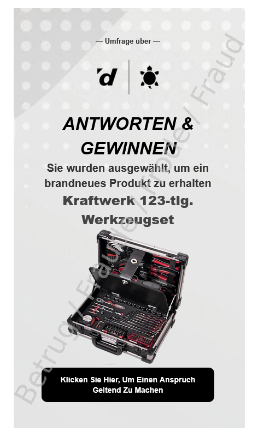27.05.2025 - A new smartphone, a shopping voucher, a bike, a new car battery, or free public transport tickets – who wouldn’t be happy to win something like that? Unfortunately, offers like these are increasingly being used by scammers to lure people into traps. Last week, the NCSC received more reports than usual about fake prize draws. What look like giveaways from well-known companies often turn out to be scams – instead of receiving a prize, victims end up stuck in costly subscriptions or have their personal data stolen through phishing.

Our inboxes and social media feeds are full of tempting offers. One particularly devious tactic used by scammers is to set up fake prize draws that appear to come from well-known companies – from supermarket chains and electronics retailers to public transport providers and telecoms firms. We’re currently seeing a surge in these dangerous scams, in which attackers exploit people’s trust in familiar brands to lure them into clicking on harmful links.
Subscription traps
Scammers usually follow the same basic pattern with this type of scam. They send emails or text messages, or post social media ads promising a big prize. In order to claim the prize, you’re asked to click on a link that leads to a website designed to resemble the official site of a well-known company. The scammers copy the company’s logos, colours and fonts to make their site appear legitimate. To create a sense of urgency, their messages often include a tight deadline or say that only a few prizes are left.
Don’t be fooled by the professional look – these scams are far from harmless. One common example is the subscription trap. It typically starts with a request to pay a small fee, supposedly to cover shipping or a participation charge, along with a prompt to enter your credit card details or confirm your phone number. What many people don’t realise is that they’ve been redirected from the fake prize draw to a site designed to lock them into an expensive subscription. By providing your details, you may be unwittingly agreeing to a costly contract, often lasting several years, with charges applied immediately to your credit card or phone bill. Cancelling these subscriptions is usually a slow and frustrating process.


Phishing
A second type of scam – less common but even more dangerous – is phishing. These fake websites ask you to share a range of personal information, such as your name, address and date of birth, along with email addresses and passwords for your online accounts. You may even be prompted to enter sensitive bank or credit card details. Scammers can then use this information to steal your identity, make purchases in your name, drain your accounts or sell your data. The damage can be serious and go well beyond just losing money.
Because of these risks, it is essential that you stay alert and help raise awareness among your friends and family.
Recommendations
- Be wary of ads on social media and emails promising tempting prizes – if something seems too good to be true, it probably is.
- Be especially cautious if you are asked to provide your credit card details or mobile phone number for something that’s supposed to be free.
- Don’t forward these types of prize draws or competitions to other people.
- Report suspicious prize draws to the relevant social media platform as possible scams.
- If you’ve shared your credit card details with scammers, contact your card provider immediately.
- If you’ve shared your mobile number, contact your mobile provider.
- The State Secretariat for Economic Affairs (SECO) recommends sending a registered letter to the provider as soon as you realise what’s happened. Your letter should state that you are contesting the validity of the agreement on the grounds that you made a mistake and that the offer on the website was intentionally misleading. It should include the following sentence: “I was misled by your website. I therefore contest the validity of the contract on the grounds of mistaken consent and intent to mislead. The contract is therefore null and void.” news.admin.ch/en/nsb?id=34118
Further information
- SECO article and brochure on online subscription fraud::
https://www.seco.admin.ch/seco/en/home/seco/nsb-news.msg-id-34118.html; - Factsheet from the Foundation for Consumer Protection on subscription fraud (in German: https://www.konsumentenschutz.ch/themen/internet/sms-und-internet-abofallen-vermeiden.
Current statistics
Last week's reports by category:
Last modification 27.05.2025





